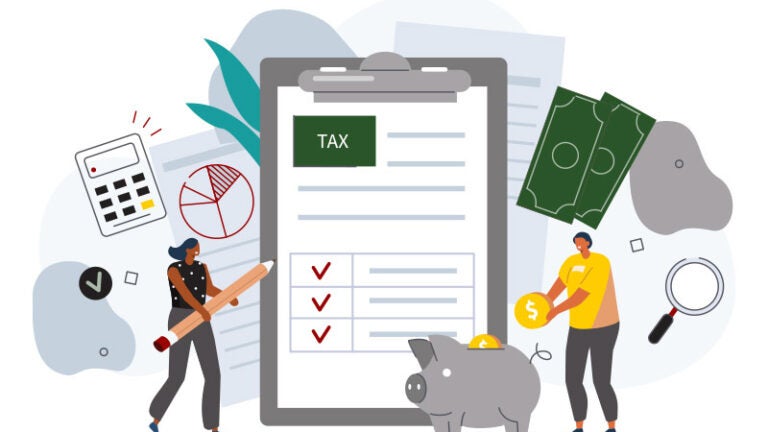
Student-faculty team argues biennial tax filing would save Americans billions
Paying taxes every two years would not only halve springtime blood pressure spikes, it could actually save the federal government and the American public up to $83 billion.
In their research study, Emma Cockerell, a senior at the USC Dornsife College of Letters, Arts and Sciences, and USC Dornsife Adjunct Professor of the Practice of Economics Jeffrey Dubin, compared the financial impact of annual versus biennial tax filing by analyzing several factors, such as the amount of money the Internal Revenue Service (IRS) spends on annual return audits, IRS staffing levels and the annual cost of tax preparation services for the public.
The research, which was featured on NPR’s “The Indicator,” showed that biennial taxation would significantly decrease the amount of money Americans spend each year on accountants and tax preparation software. It would also ease the pressure on enforcement staff at the IRS — already stretched thin due to budget cuts — and allow them to pursue noncompliance issues, like tax evasion, more thoroughly.
Between 2011 and 2013, noncompliance cost the government about $380 billion in annual revenue. With biennial tax filing, IRS auditors could handle twice as many returns and spend more time investigating them, Cockerell says. Meanwhile, she adds, the American public typically spends $67 billion on tax preparation each year, a figure that includes both the cost of accounting services and the amount of time individuals spend calculating their own taxes.
“The tax system as it imposes huge burdens on everyday Americans,” Cockerell says. “Part of making it more equitable is making it more accessible, cheaper, less burdensome for low-income earners.”
Exploring an idea

Economics major Emma Cockerell. (Photo: Courtesty of Emma Cockerell.)
Cockerell, who is majoring in economics/mathematics, says her partnership with Dubin began in spring 2020, when she took his Economic Consulting and Applied Managerial Economics (ECON 474) class. Dubin mentioned during the course that he often has research work for students who are looking to invest some extra effort in their studies.
“If I find a bright student, like Emma is, I’ll give them a number of different choices of things that they might work on, and I try to pick something that they like,” Dubin says. “[Biennial taxation] was an idea that had been kicking around in my head for a while.”
Cockerell says that she enjoyed reading Dubin’s previous research on taxation, as she felt it was “rare” for students to see what their professors study outside of a given course. And the project turned out to be more interactive and interesting than she thought research work would be.
“I had previously thought that research can be dry, and academic, but this was a very collaborative effort in that we would frequently bounce ideas off of each other,” she says.
One of the most interesting moments during their work, Cockerell says, was when she learned how much money TurboTax — the popular tax preparation software that Cockerell herself has used — spent on lobbying Congress to prevent tax reforms that would simplify the system.
“One example we mentioned in the paper is the ReadyReturn system in California, which was piloted to much success but didn’t work out because it directly affects TurboTax’s business,” she explains. “If the state of California is sending people’s tax returns to them already filled out, just as many other countries around the world do, TurboTax is no longer needed by a large segment of people,” she explains.
Tax preparation services have also lobbied to prevent biennial filing due to the fact that it would negatively impact their business.
Dubin says research provides a way to complement classroom lessons and help undergraduates improve skills, such as writing and analysis, that they will need later in life.
“In my experience, it’s unusual to work with undergraduates, but I think it’s very important,” he says. “For example, Emma wants to go to law school, so it’s important that she learn how to write and structure her arguments.”
Cockerell adds that in addition to gaining experience in writing and analysis, she enjoyed being able to take analyses she learned in Dubin’s class and apply them to a real-world setting. Seeing them featured in an academic journal and in mainstream media was even better, she says.
“If you’d told me two years ago that I would have co-written a paper with a professor, much less one about taxation, I would have been really surprised.”